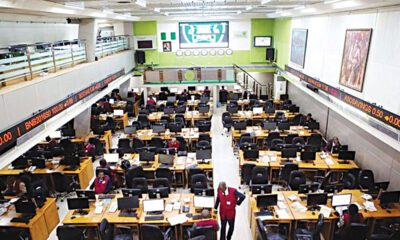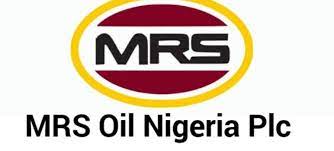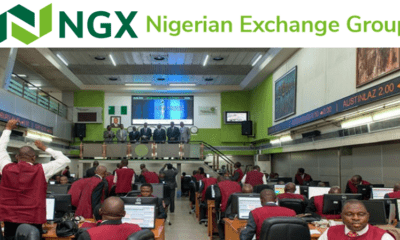Business
Transactions on NGX decline by 13.81%

The value of transactions on the stock market of the Nigerian Exchange Ltd.(NGX) went down by 13.81 percent on Tuesday after two days of Easter break
Analysis of the market activities showed trade turnover settled lower relative to the previous session.
As a result, a total of 545.49 million shares valued at N14.61 billion were exchanged in 12,747 deals, as against 623.08 million shares valued at N16.95 billion exchanged in 10,257 deals traded on Thursday.
Meanwhile, Guaranty Trust Holding Company (GTCO) led the activity chart in volume and value with 84.65 million shares traded in value of 4.48 billion.
Access Corporation sold 68.89 million shares worth N1.73 billion, United Bank of Africa(UBA) traded 65.49 million shares valued at N1.83 billion.
Zenith Bank traded N62.59 million shares worth N2.77 billion and Transnational Corporation transacted 27.43 million shares valued at N383.63 million.
Consequently, the market capitalisation shed N25 billion or 0.04 percent to close at N59.095 trillion, as against N59,120 trillion recorded previously.
The All-Share Index also dropped 0.04 percent or 44 points to settle at 104,518.14, compared to 104,562.06 posted in the previous session.
As a result, the Year-To-Date (YTD) return slipped to 39.78 percent.
Losses in the shares of FBN Holdings, Stanbic IBTC, Transnational Corporation, Julius Berger, among other top losers dragged the market performance down.
However, market breadth closed positive with 23 gainers and 17 losers on the floor of the Exchange.
On the gainers’ table, May and Baker Nigeria Plc led by 10 percent to close at N6.05, Ikeja Hotel gained 9.95 percent to close at N7.07 per share.
Chams rose by 9.90 percent to close at N2.11, Unity Bank went up by 9.66 per cent to close at N2.27 and AIICO Insurance grew by 9.65 percent to close at N1.25 per share.
Conversely, UAC of Nigeria Plc led the losers’ table by 9.82 percent to close at N12.40, followed by Julius Berger by 9.17 percent to close at N59.95 per share.
ABC Transport trailed by 9.09 percent to close at 70k, Universal Insurance declined by 7.69 percent to close at 36k, while UPDC Real Estate Investment Trust dropped 6.67 per cent to close at N1.40 per share.
Business
Dangote Refinery will get valid operating licence soon – FG


The Federal Government announced that it is set to issue a fully valid operating licence to the 650,000 barrels per day capacity Dangote Petroleum Refinery.
It announced this at the Stakeholders’ Consultation Forum on Midstream and Petroleum Host Community Development Trust Regulations organised by the Nigerian Midstream and Downstream Petroleum Regulatory Authority in Abuja.
The NMDPRA, an agency of the Federal Government, however, explained that though it had awarded a pre-commissioning licence to the $20bn refinery, a fully valid operating licence would be issued to the Dangote refinery soon.
Dangote refinery was inaugurated by former President Muhammadu Buhari in May 2023. The facility started releasing Automotive Gas Oil, popularly called diesel to the domestic market in April this year. It has yet to release Premium Motor Spirit, popularly called petrol.
Speaking at the forum in Abuja on Tuesday, the Chief Executive, NMDPRA, Farouk Ahmed, told industry players and other stakeholders that the authority would issue a fully valid operating licence to the refinery very soon.
Ahmed, who was represented by the Executive Director, Distribution Systems, Storage and Retailing Infrastructure, NMDPRA, Ogbugo Ukoha, pointed out that currently, only three refineries have valid licences.
“We have issued three refineries with three valid licences. We awarded to Dangote refinery even in their pre-commissioning and sooner than later they will have full commission and a valid licence to also operate,” he stated.
He also stated that about 15 gas facilities across the country have valid licences while more are undergoing processing.
The NMDPRA boss said there are 1,199 facilities with valid licences in the downstream, while more than 176 operators hold gas import permits.
Ahmed said 130 depots have valid licences while 69 hold valid coastal vessel licences, adding that NMDPRA has licensed 9,464 retail outlets as of 10 am on April 30, 2024.
“In the gas processing facility within the midstream, there are about 15 of them with valid licences. And much is under processing. If you go to the downstream sector, in the gas state of the downstream, more than 1,199 facilities have NMDPRA valid licences.
“More than 176 operators hold gas import permits. In the liquid licensing side of the downstream, there are 130 depots with valid licences and coastal vessels of more than 69 valid licences as of today. And in the retail outlets, we have 9,464 licensed retail outlets as of 10 am today, April 30,” Ahmed stated.
He explained why locations in the midstream and downstream arms of the oil sector were included as part of host communities, stating that emissions and effluence affect them.
Ahmed said the authority organised the forum for stakeholders to ventilate their ideas and proffer measures that would further enable the NMDPRA to relate better with host communities in the mid and downstream arms of the oil sector.
Business
Cost of healthy diet stood at N982 in March – NBS


The National Average Cost of a Healthy Diet (CoHD) per adult a day stood at N982 in March 2024, the National Bureau of Statistics (NBS) has said.
The NBS said this in its CoHD report for March 2024 released on Tuesday in Abuja.
The bureau said the CoHD in March increased by 4.7 percent compared to the N938 recorded in February.
The NBS said the CoHD was the least expensive combination of locally available items that met globally consistent food-based dietary guidelines.
It said it was used as a measure of physical and economic access to healthy diets.
“This is a lower bound (or floor) of the cost per adult per day excluding the cost of transportation and meal preparation.”
The bureau said that to compute the CoHD indicator, the following data on Retail Food Prices, Food Composition Data, and Healthy Diet Standard were required.
The NBS also said that in March, the average CoHD was highest in the South-West at N1,198 per adult per day, followed by the South-East at N1,140 per day.
It said the lowest average CoHD was recorded in the North-West at N787 per adult per day.
The NBS further said that at the state level, Ekiti, Lagos, and Abia recorded the highest CoHD at N1330, N1249, and N1215.
The bureau said Katsina recorded the lowest CoHD at N739, followed by Sokoto and Zamfara at N758 and N766.
The NBS said CoHD had steadily increased since the first CoHD report by the bureau in October 2023.
“The CoHD in March 2024 is 40 per cent higher than what was recorded in October 2023 at N703 and five per cent higher than CoHD in February 2024, which was N938.
“The food groups that have driven the increases in CoHD the most are vegetables, starchy staples, and fruits. The cost of meeting the recommendations for oil and fats have changed the least.”
According to the report, animal-source foods are the most expensive food group recommendation to meet in March, accounting for 37 percent of the total CoHD to provide 13 per cent of the total calories.It noted that fruits and vegetables were the most expensive food groups in terms of price per calorie.
“They accounted for 12 percent and 14 percent, respectively of the total CoHD while providing only seven per cent and five per cent of total calories in the Healthy Diet Basket.
“Legumes, nuts and seeds were the least-expensive food group on average at six per cent of the total cost.”
The report also said that in recent months, the CoHD had risen faster than general inflation and food inflation.
“However, the CoHD and the food Consumer Price Index (CPI) are not directly comparable.
“The CoHD includes fewer items and is measured in Naira per day, while the food CPI is a weighted index.
“The food CPI increased approximately by four per cent between January and February, while CoHD increased by nine per cent.”
The NBS said the policy implications of these results would foster collaboration among a wide range of stakeholders, such as policymakers, researchers and civil society actors that focus on food security.
“These stakeholders will devise strategies that tackle access, availability, and affordability of healthy diet effectively.
“Also, future research incorporating income can also be used to determine the proportion and number of the population that are unable to afford a healthy diet,” the report said.
Business
Seplat Energy achieves 2.3 million hours without LTI in Q1 2024


Seplat Energy PLC has disclosed that it achieved more than 2.3 million hours without Lost Time Injury (LTI) at Seplat-operated assets in Q1 2024.
This was disclosed in the energy company’s unaudited results for the three months ended 31 March 2024.
For the period under review, production averaged 49,258 barrels of oil equivalent per day (boepd), down 4.8 percent on prior period (3M 2023: 51,720 boepd), but 5.7 percent above Q4 2023 production, and towards the upper end of 2024 guidance (44,000 boepd – 52,000 boepd).
The Company also applauded the progressive moves taken by President Bola Tinubu and the industry regulators, following the signing of the executive orders that will provide fiscal incentives in Nigeria’s gas and midstream businesses. In addition, an executive order was signed and gazetted into law, which has the potential to materially improve our contracting process and bring the right level of efficiency that will support cost reductions. This can drive the much-needed efficiency gains across our industry.
The Nigerian Midstream and Downstream Petroleum Regulatory Authority (NMDPRA) recently lifted the domestic gas price to $2.42/Mscf supporting revenue generation and re-emphasising the government’s commitment to develop Nigeria’s gas resources, a factor aligned with Pillar 2 in our strategy.
According to Seplat Energy, the message to investors on the acquisition of ExxonMobil’s share capital in Mobil Producing Nigeria Unlimited (MPNU) is unchanged. Dialogue between key parties is active and constructive, and the company remains confident that a conclusion will be reached on the transformational acquisition.
Commenting on the results, Chief Executive Officer, Seplat Energy Plc, Roger Brown said, “Seplat Energy continued its trend of strong operational performance in the first quarter. Oil production on OMLs 4, 38, 40 and 41 outperformed expectations, benefiting from low pipeline losses and deferments, which were ahead of plan. Cash flow was down in the first quarter, but this is largely due to the timing difference of lifting oil from the terminals. The business remains strong, production is firmly on track this year and price realisations remain supportive of cash generation.
“In our FY 2023 results we outlined several growth opportunities for 2024. The first of these to start generating revenue for Seplat is Sibiri, which came on stream just a few weeks after the FDP approval was received from NUPRC. At Abiala (a marginal field within OML 40), the drilling programme is on track to start during 2Q. We were delighted to see resumption of operations on the Trans Niger Pipeline in April, approximately four months ahead of plan. Access to the pipeline will enable us to increase production from OML53, as well as providing the primary export route for condensate from AGPC, which remains on track for first gas in 3Q 2024.
“Looking further forward, we are pleased to share that we discovered hydrocarbons in deeper reservoirs than had previously been tested at Sapele-37 and Okhorpuru-9. The initial results are promising, again highlighting the world class quality of the geology in Nigeria.
“In Nigeria, we were pleased to see more progressive actions taken by President Tinubu and the industry regulators. In March, the President signed executive orders that will provide fiscal incentives in our gas and midstream businesses. In addition, an executive order was signed and gazetted into law, which has the potential to materially improve our contracting process and bring the right level of efficiency that will support cost reductions. We applaud the change, which can drive much needed efficiency gains across our industry. More recently NMDPRA lifted the domestic gas price to $2.42/Mscf supporting revenue generation and re-emphasising the government’s commitment to develop Nigeria’s gas resources, a factor aligned with Pillar 2 in our strategy.
“Our message to investors on MPNU is unchanged. Dialogue between key parties is active and constructive, and we remain confident that we can reach a conclusion on this transformational acquisition,” he said.
-
capital market2 years ago
Rt.briscoe, FBNH, Others halts negative performance of stock market
-
Finance3 months ago
Court orders Sen. Victor Umeh to repay N136m bank debt to AMCON
-



 Abuja Update2 months ago
Abuja Update2 months agoUNDP, FG partnership needed to achieve inclusion, equity- Minister
-
Abuja Update1 month ago
Banks drive stock market performance with N147bn gain
-



 Business1 week ago
Business1 week agoTingo Group unveils Tingo Electric, Tingo Cola drink at Lagos launch
-



 Health2 weeks ago
Health2 weeks agoCapacity training will reduce migration of health workers- NPHCDA
-
News4 months ago
Oil thieves sponsoring malicious media campaign against Navy – Spokesman
-



 Infotech1 month ago
Infotech1 month agoWorld Backup Day: NITDA urges Nigerians to ensure backup of data














